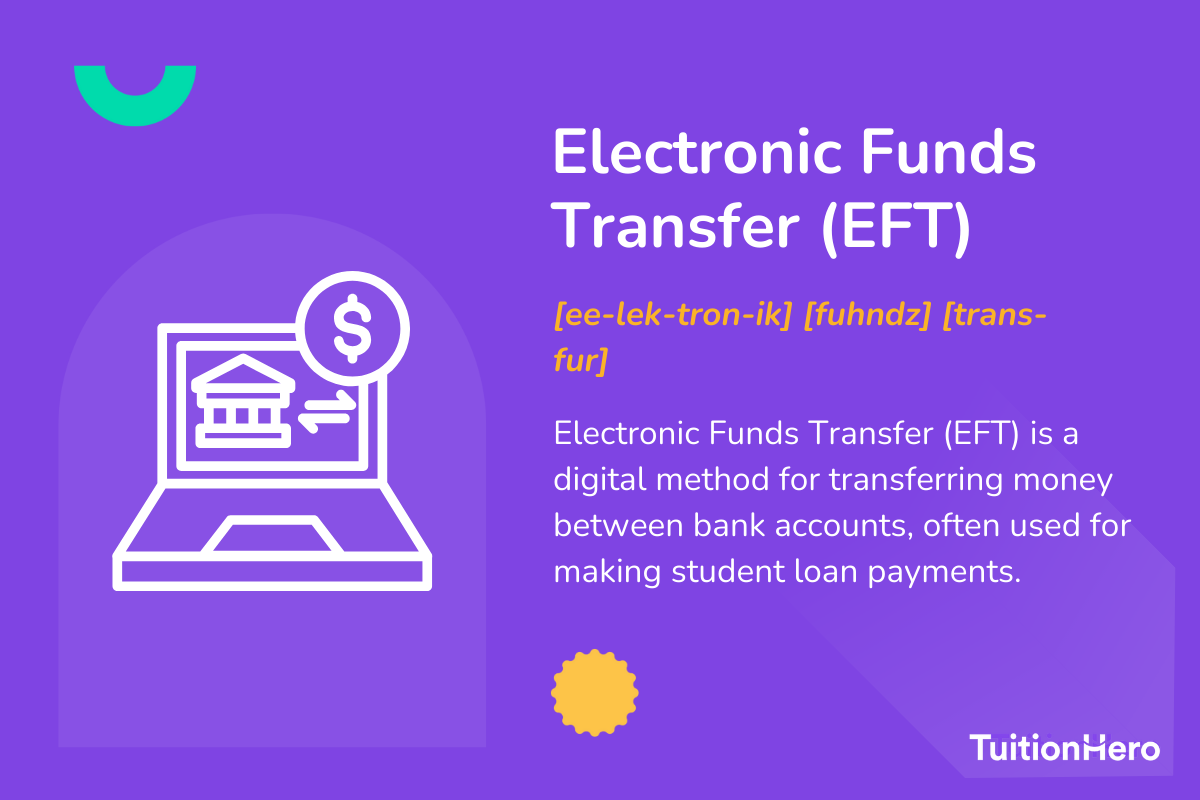Advertiser Disclosure
Last update: November 17, 2024
6 minutes read
What is an Electronic Funds Transfer (EFT)?
Learn how to use EFT payments easily. They're fast, safe, and can be very useful. Get tips on what to do and what to avoid for a smooth digital payment experience.

By Brian Flaherty, B.A. Economics
Edited by Rachel Lauren, B.A. in Business and Political Economy
Learn more about our editorial standards



By Brian Flaherty, B.A. Economics
Edited by Rachel Lauren, B.A. in Business and Political Economy
Learn more about our editorial standards
Ever wondered how money moves around the world without anyone passing physical cash? Interested in how online payments work? Today, let's explore electronic funds transfer (EFT) payments to understand how digital transactions make money go global with just a click.

Key takeaways
- EFT payments streamline digital transactions, offering speed, security, and accessibility
- Navigating the do’s and don'ts of EFT ensures a secure and efficient financial journey
- Understanding the advantages and disadvantages of EFT empowers you to make informed decisions
What is an electronic funds transfer (EFT)?
An electronic funds transfer (EFT) is a quick and easy way to move money between bank accounts using digital methods like credit card payments, ACH transactions, and wire transfers. Instead of using physical cash or paper checks, it's like getting a digital nod from the bank that says, "Transfer those funds!"
If you’re anything like me, you probably find yourself relying on EFT payments a ton for your daily expenses. Whether I’m paying for coffee with my credit card or paying my rent online, EFT payments have dramatically reduced my use of cash or checks.

How do EFT payments work?
EFT payments are a way to transfer money between bank accounts electronically. When you start an EFT payment, your bank talks securely with the other person's bank to move the money.
You share details like their account number and how much you want to send. The process is safe because it uses authentication and encryption to protect the transaction.
There are 2 main types of EFT payments: ACH (Automated Clearing House) transfers and wire transfers. ACH transfers are good for regular bills you pay every month. Wire transfers are faster and better for one-time or urgent transactions.

TuitionHero Tip
Once you begin the EFT, the money leaves your account and goes to the other person's account. EFTs are a fast, safe, and easy way to handle different money tasks without using physical cash or checks.
Who are the players in an EFT transaction?
In an EFT transaction, there are important roles played by different people and organizations to make sure the money moves smoothly:
- Initiator or sender: This is the person or group starting the EFT, like someone paying bills online or a business putting money into employee accounts.
- Receiver or beneficiary: This is the one getting the money, whether it's a person, a company, or someone providing a service.
- Banks or financial institutions: These are crucial in the EFT process. The sender's bank helps take out the money, and the receiver's bank handles putting it in.
- Automated Clearing House (ACH): ACH is a network that helps transfer money electronically between banks. It's a central system making sure EFT transactions are safe and secure.
- Payment gateway (for online transactions): In online transactions, a payment gateway might be there. It safely approves and handles the EFT, especially when buying things online.
What types of EFT payments exist?
Different types of EFT payments are available to meet many different financial needs:
- Direct deposit: Employers use direct deposit to put employees' salaries straight into their bank accounts. It's a handy and quick way to get regular income.
- ACH transfers: Automated Clearing House (ACH) transfers are common for various transactions, like paying bills, settling with vendors, and moving money between accounts. They're especially useful for regular payments.
- Wire transfers: Wire transfers are fast EFT payments used for urgent or one-time transactions. They’re a direct and quick way to move money between banks, but often come with hefty fees.
- Online bill pay: Many banks offer online bill pay services, letting people schedule electronic payments for their bills right from their bank accounts.
- Mobile payments: Thanks to mobile banking apps, you can make EFT payments using your smartphone. This covers person-to-person payments, splitting bills, and making purchases.
Why should you embrace EFT?
Why use Electronic Funds Transfers (EFT)?
- Fast and efficient: EFT gets your transactions done quickly, giving you access to your money without waiting a long time like you would with checks.
- Convenient: No need for physical checks or cash. You can easily do transactions from home or wherever you are using online banking or mobile apps.
- Secure: EFT keeps your transactions safe by using encryption and authentication. This means your financial info is protected, and you don't have to worry as much about lost or stolen paper payments.
- Saves money: EFT transactions usually have lower fees than traditional methods. With fewer manual processes, it cuts down on costs for businesses and can even save on paper and postage.
- Automates recurring payments: Perfect for setting up automatic payments for things like bills or subscriptions. It ensures your payments happen on time without you having to do it manually.
- Better record-keeping: EFT gives you digital records of your transactions, making it easy to see and manage your money. This is handy for budgeting and keeping track of your finances.
Compare private student loans now
TuitionHero simplifies your student loan decision, with multiple top loans side-by-side.
Compare Rates
How has finance evolved with EFT?
Electronic Funds Transfer (EFT) has changed the way we handle money. It's made things faster, more efficient, and connected globally.
We've moved from slow paper transactions to quick digital transfers. EFT isn't just good for speed; it's also helping the environment by reducing the need for paper. Plus, it's safer with advanced security measures like encryption and authentication.
Now, financial services are more accessible with online banking and mobile apps available 24/7. EFT has automated financial tasks, making fewer mistakes and making things smoother for both businesses and people. In short, EFT has brought finance into the modern age, creating a system that's fast, efficient, and secure.
Dos and don’ts of electronic fund transfers (EFT)
Using Electronic Funds Transfers (EFT) is easy if you follow some simple guidelines. Here's a quick look at what you should and shouldn't do:
Do
Use secure and trusted platforms.
Double-check recipient information.
Keep passwords and pins confidential.
Regularly update security settings.
Don't
Share sensitive banking details casually.
Ignore regular account monitoring.
Rely solely on one EFT method.
Disregard email or SMS alerts from your bank.
Advantages and disadvantages of electronic funds transfers (EFT)
Explore Electronic Funds Transfers (EFT) with an understanding of its good and not-so-good points.
- Speed: quick movement of money, great for transactions that need to happen fast.
- Security: strong digital protections keep your money safe from physical risks.
- Accessibility: easy to use, making online transactions hassle-free.
- Potential Delays: some payments might take 2-3 business days to go through.
- Tech Glitches: sometimes, using digital platforms can have technical issues.
- Learning Curve: certain EFT methods, like wire transfers, might seem a bit tricky at first.

Why trust TuitionHero
At TuitionHero, we simplify college finances with private student loans, refinancing, scholarships, FAFSA help, and credit card offers. Think of us as your financial ally, ready to support every step of your college journey. From tuition payments to student loans, we’re here to help. Let’s make your financial knowledge work for you—together.
Frequently asked questions (FAQ)
EFTs work well for transactions within a country, but they can face challenges when it comes to sending money internationally. Things like changing currencies and different banking systems might make the process slower and more costly.
The most money you can transfer with EFT depends on the service or bank you're using. Each platform has its own rules to keep transactions secure. To find out the specific maximum limit for EFT transactions, it's best to ask your bank or the service that's helping with the transfer.
Yes, lots of schools and financial services let you schedule automatic payments for your tuition. This makes sure you pay on time without having to do it yourself each time. Just ask your school to make paying tuition easier and avoid late fees.
When you send money through EFT, you usually can't undo it. EFT is designed to be quick and secure, so reversing it isn't common. Before you confirm, it's really important to check all the details. If you ever face problems or have questions about a transfer, it's a good idea to contact your bank or financial service provider right away. Generally, it’s much harder to reverse or cancel wire transfers than ACH transfers.
Final thoughts
In the world of digital money, Electronic Funds Transfers (EFT) are important. They link economies and affect how finances work. We at TuitionHero are here to help you with financial matters, not just watch from the sidelines. Whether you're dealing with EFT payments or figuring out student loans, we're here for you. Join TuitionHero to learn about money and take action. Get in touch with us, and together, let's make your academic goals real.
Source
Author

Brian Flaherty
Brian is a graduate of the University of Virginia where he earned a B.A. in Economics. After graduation, Brian spent four years working at a wealth management firm advising high-net-worth investors and institutions. During his time there, he passed the rigorous Series 65 exam and rose to a high-level strategy position.
Editor

Rachel Lauren
Rachel Lauren is the co-founder and COO of Debbie, a tech startup that offers an app to help people pay off their credit card debt for good through rewards and behavioral psychology. She was previously a venture capital investor at BDMI, as well as an equity research analyst at Credit Suisse.
At TuitionHero, we're not just passionate about our work - we take immense pride in it. Our dedicated team of writers diligently follows strict editorial standards, ensuring that every piece of content we publish is accurate, current, and highly valuable. We don't just strive for quality; we aim for excellence.
Related posts
While you're at it, here are some other college finance-related blog posts you might be interested in.
Shop and compare student financing options - 100% free!

Always free, always fast
TuitionHero is 100% free to use. Here, you can instantly view and compare multiple top lenders side-by-side.

Won’t affect credit score
Don’t worry – checking your rates with TuitionHero never impacts your credit score!

Safe and secure
We take your information's security seriously. We apply industry best practices to ensure your data is safe.
Finished scrolling? Start saving & find your private student loan rate today





